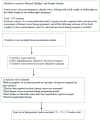Chronic Stress in Pregnancy Is Associated with Low Birth Weight: A Meta-Analysis
- PMID: 38137756
- PMCID: PMC10743391
- DOI: 10.3390/jcm12247686
Chronic Stress in Pregnancy Is Associated with Low Birth Weight: A Meta-Analysis
Abstract
Background and objectives: Chronic activation of the stress system has cumulative effects on the body, and it places individuals at risk for adverse health outcomes. Chronic stress has been assessed by health questionnaires in pregnancy. During the perinatal period, mothers experience increased physical and emotional demands. Chronic stress interferes with hormonal functions in mothers and infants. This meta-analysis studies the effect of maternal chronic stress during pregnancy, as assessed by established stress questionnaires, on the birth weight of their full-term infants.
Design and methods: According to our criteria and after research collection, we obtained 107 studies and we conducted two types of analyses: a logistic (N = 22,342) and linear regression analysis (N = 7431).
Results: Our results show that chronic stress is associated with a statistically significant risk of low birth weight (OR = 1.50, CI 95% = [1.13; 1.99], p ≤ 0.02).
Conclusions: Increased maternal chronic stress, as assessed by questionnaires, in pregnancy is associated with a low-birth-weight baby. The above meta-analysis indicates that maternal high chronic stress questionnaire scores could be used as a clinical tool in order to assess low-birth-weight risk.
Keywords: birth weight; chronic stress; perinatal period; pregnancy; stress questionnaires.
Conflict of interest statement
The authors report no conflict of interest.
Figures
References
-
- Cohen S., Kessler R.C., Gordon L.U. Measuring Stress: A Guide for Health and Social Scientists. Oxford University Press; New York, NY, USA: 1995.
-
- Katsuhara S., Yokkomoto-Umakoshi M., Matsuda Y., Iwahashi N., Kaneko H., Ogata M., Fukumoto T., Terada E., Sakamoto R., Ogawa Y. Impact of cortisol on reduction in muscle strength and mass: A Mendelian Randomization Study. J. Clin. Endocrinol. Metab. 2022;107:1477–1487. doi: 10.1210/clinem/dgab862. - DOI - PubMed
Publication types
LinkOut - more resources
Full Text Sources




